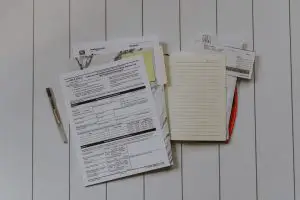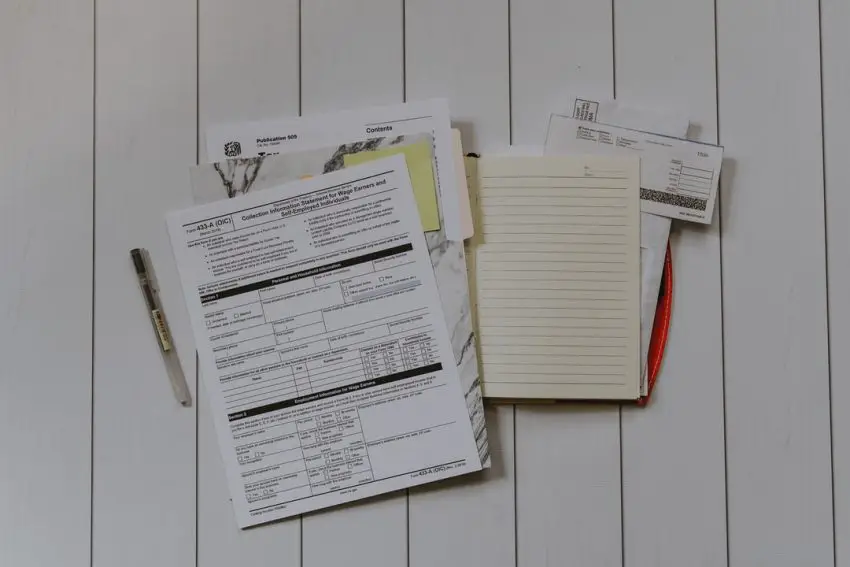Knowing what small business tax forms you need when you start a new venture is vital to your success. With over five million new business applications being filed in 2021, more and more people choose the entrepreneurial lifestyle each year. Being prepared with the right forms and information will help set you up on the right path.
When you’re a small business owner, you’ll file out many different tax forms that you wouldn’t have as an individual. These forms cover a wide range of situations, such as reporting your expenses or hiring new employees.
Whether you’ve been in business for years or you’re one of the many starting a new business, getting a better understanding of what tax form for small businesses you need will help you immensely. This guide will discuss what tax forms you need when you open a small business.

Contents
Application for Employer Identification Number
One of the first forms you’ll need is Form SS-4. You use this form to apply for an employer identification number or EIN. Your EIN is a nine-digit number that’s unique to your business.
EINs get assigned to the following types of businesses:
- Sole proprietors
- Employers
- Corporations
- Partnerships
Keep in mind that you might not need an EIN if you’re a sole proprietor with no employees. There are benefits to having an EIN, such as making it easier to manage your business and personal finances. All you have to do is fill out the form and file it with the IRS via mail, fax, or online.
Forms for Filing and Paying Taxes
Most of the IRS business forms you have to fill out are related to your small business taxes. Which forms you fill out and the taxes you pay depend upon your business. Your business’s entity type, employees, and industry factor into your tax responsibility.
Of the above factors, your business entity type has the biggest impact on your taxes. Below are the tax-related forms that you might need to fill out based on your entity type.
Sole Proprietorships
If you’re the single operator and owner of your business, then your business is a sole proprietorship. In addition to submitting income tax forms for your company, you’ll also have to file self-employment taxes.
The most common forms you’ll have to complete include:
- Form 1040: Individual income tax return
- Form 1040 Schedule C: Report your annual business income or loss
- Form 1040 Schedule C-EZ: Reports your annual profit for smaller businesses
- Form 1040-ES: Calculate and pay your business’s estimated taxes
- Form 1040-SE: Self-employment taxes
Partnerships
If your small business is a partnership, you’ll have to pay taxes for the partnership as a whole organization. Additionally, you’ll have to pay taxes as an individual.
Some of the forms you’ll have to fill out include:
- Schedule K-1: Determines each partner’s share of income and losses
- Form 1065: Annual information return to report gains, losses, income, credits, and deductions for your company
However, as a partnership, you don’t have to pay income taxes. That tax burden gets passed on to each partner. You’ll have to also fill out the following forms as a partner:
- Form 1040
- Form 1040-ES
- Form 1040-SE
You might have to also file Form 1040 Schedule E, depending upon your business. This form reports the supplemental loss and income from your partnership.
Corporations
What forms you fill out as a corporation depends upon whether you’re a C or S corporation.
As a C corporation, your company is legally separated from you. You’ll have to pay income tax using Form 1120. This form is an annual report of gains, income, losses, credits, and deductions that determine your corporation’s income tax liability.
Since you’re a shareholder of your corporation, you’re also taxed on your individual tax return. If you’re a shareholder that also participates in your company’s operations, the IRS considers you to be an employee. The salary you receive is can get taxed with self-employment taxes.
If you’re part of an S corporation, you’ll need to fill out the following forms:
- Form 1120S: Annual report of gains, income, deductions, credits, and losses
- Form 1120S Schedule K-1: Calculates each individual shareholder’s responsibility for the loss or profit of the business
If you’re a shareholder in an S corporation, you might have to complete a Form 1040 Schedule E and a Form 1040-ES in your individual tax return.
For both S and C corporations, you might have to fill out Form 1120-W. This form calculates the estimated tax that your corporation will have to pay each quarter.
Limited Liability Company (LLC)
Figuring out what forms you have to fill out when you’re part of an LLC can be complicated. The IRS might consider your LLC a partnership, corporation, or part of the owner’s tax return. If the LLC is considered to be part of the owner’s tax return, the owner will report the expenses and income of the businesses using a Form 1040 Schedule E or C.
If the company has at least two members, it’s thought to be a partnership. You’ll have to file Form 1065 and a Schedule K-1 for each member. LLCs that file as a partnership also has to pay self-employment tax on their individual share of the company’s earnings. You’ll have to also fill out a Form 1040-SE or Form 1040-ES on your personal return.
For those who want to change how their LLC is classified, you can fill out Form 8832. You can specify how you want your LLC to be classified, whether that’s a sole proprietorship, partnership, or C corporation.
Tax Forms for Your Employees
No matter what type of entity your business is, if you have employees, there are additional forms you’ll have to complete. These IRS forms can report income and tax information for each employee, in addition to their benefits.
Below are some common tax forms for employees:
- Form W-2: Reports your employees’ tax withholdings and wages
- Form W-3: Transmits W-2s to the Social Security Administration
- 1099-MISC Form: Reports wages and any withheld taxes for contract employees
- Form 1099-R: Reports distributions for annuities, pensions, profit-sharing plans, etc.
- Form 940: Yearly report of your company’s federal unemployment tax obligations
- Form 941: Quarterly filing that reports employee income and withheld Medicare and Social Security taxes
- Form 943: Tax withholding and wages for agricultural employees
- Form 944: For businesses that have $1,000 or less employment tax liability
- Forms 3921 and 3922: Forms that detail the transfer of company stock to an employee
If you offer your employees benefits, such as retirement or pension accounts, you might have to fill out additional forms.
Other Tax Forms
Depending upon your business’s circumstances, you might have to fill out additional forms. Some of the most common ones are below:
- Form 1040 Schedule F: Reports losses and profits from farming
- Form 1045: Apply for a fast tax refund
- Form 720: Report and pay your company’s federal excise tax liability each quarter
- Form 4562: Report the amortization or depreciation of vehicles or property used for your company
- Form 8829: Determine if you can claim your home expenses as a tax deduction
- Form 5329: Report additional taxes on various retirement plans
- Form 8283: Report and claim deductions for noncash charitable gifts of more than $500
- Form 8606: Nondeductible contributions to IRAs and distributions from IRAs
- Form 7004: Request an extension to file certain tax information and forms
As we said before, the entity type of your company will play a major role in what tax forms you fill out.
Forms for Operating a Business
Most of the IRS forms you have to fill out will relate to your personal and business taxes. There are additional forms that you might have to complete that apply to your company’s operations.
Below are some of the most common ones you’ll need:
- Form 2553: Elect to be considered an S corporation
- Form 2848: Authorize an individual, like your business lawyer or accountant, to represent your company to the IRS
- Form 4797: Reports the exchange or sale of business property
- Form 8822-B: Notifies the IRS that you’ve changed your business location or mailing address
Get Your Records Together
Before you begin filling out any tax forms, you need to gather all of your records together. This includes both electronic and paper documents, anything that relates to your business’s expenses and earnings.
One tip is to keep a spreadsheet going throughout the year to keep track of and organize all of your transactions. Calculating your deductions and income is much easier when you have a record of them.
Don’t Forget the Deadlines
There are different filing deadlines throughout the year. For example, if you use a Schedule C form, it can be included with your taxes for April 15.
On the other hand, if you’re taxed as a C-corporation, you’ll have to file a Form 1120 by the 15th day of the fourth month after the close of the tax year. For most taxpayers, that day is April 15 or the next business day.
If you’re an S-corporation, you have to file Form 1120S. It needs to be filed by the 15th day of the third month after the close of the tax year. Most of the time that’s March 15.
Figure Out What Small Business Tax Forms You Need
Knowing what small business tax forms you need can be complicated, especially if you’re just starting out running your business. Doing your research ahead of time is key to filing your small business taxes correctly.
For more information on small business taxes, check out one of our other articles.
Learn More
Accounting Basics for eCommerce Businesses (Ultimate Guide)
18 Tax Deductions for Electricians in 2021-2022 (Ultimate Guide)
18 Tax Deductions for Painters in 2021-2022 (Ultimate Guide)
19 Best Tax Deductions for Mechanics and Repair Shop Owners in 2021-2022 (Ultimate Guide)
19 Best Tax Deductions for Landscapers and Landscaping Business in 2021-2022
18 Tax Deductions for Photographers in 2021-2022 (Ultimate Guide)
11 Common Legal Tax and Business Issues facing Small Businesses
Why Small Businesses Are Important (A Must Read)






11 thoughts on “What Small Business Tax Forms Do You Need? (All You Need to Know)”